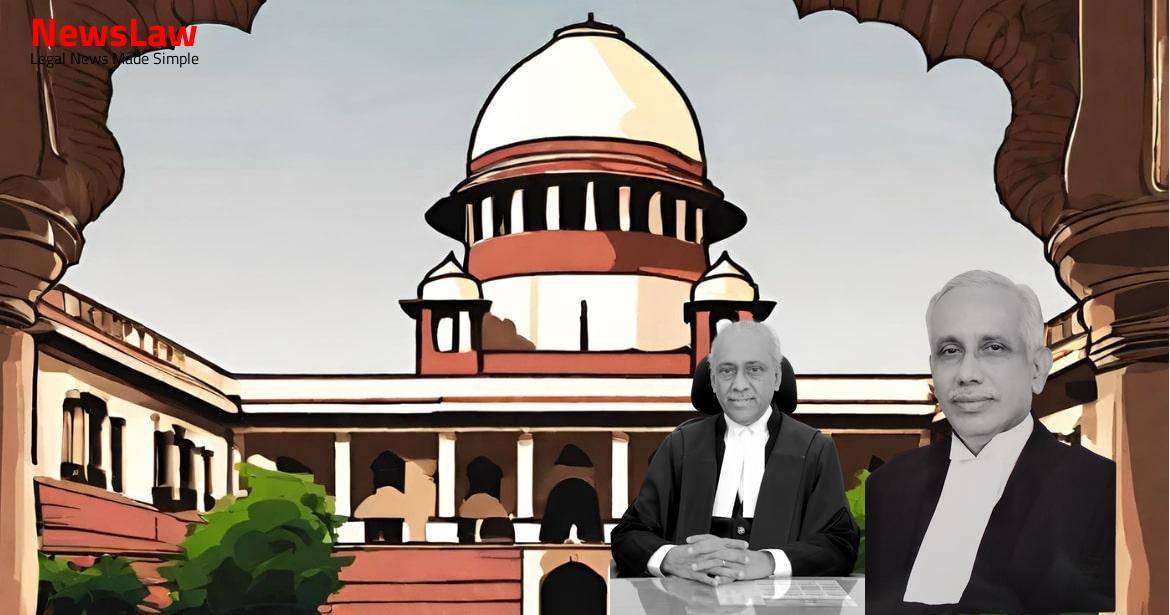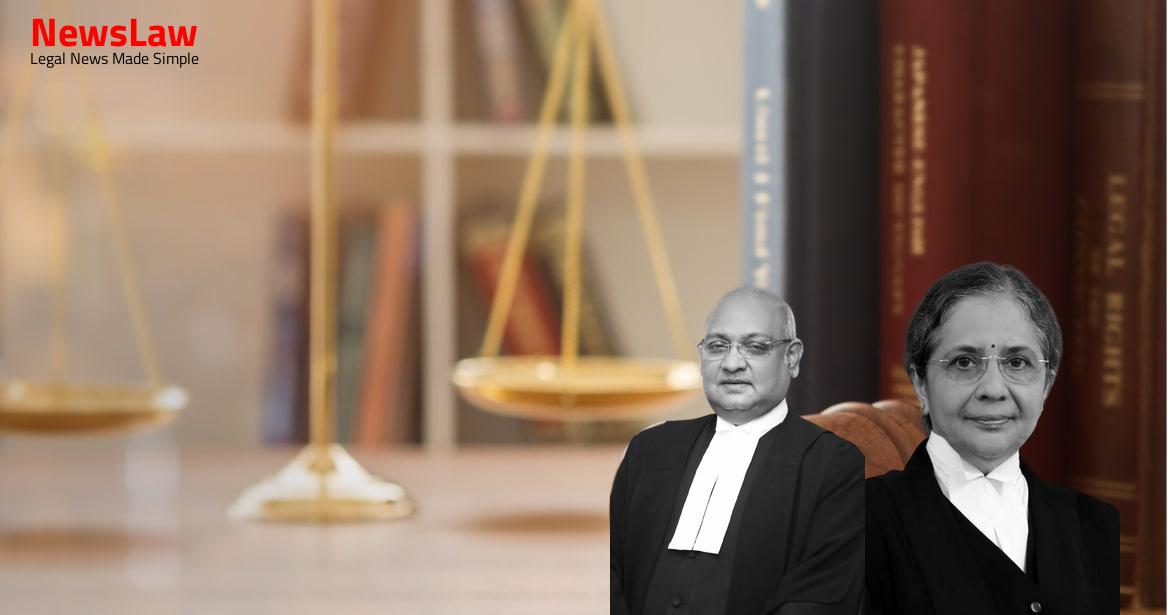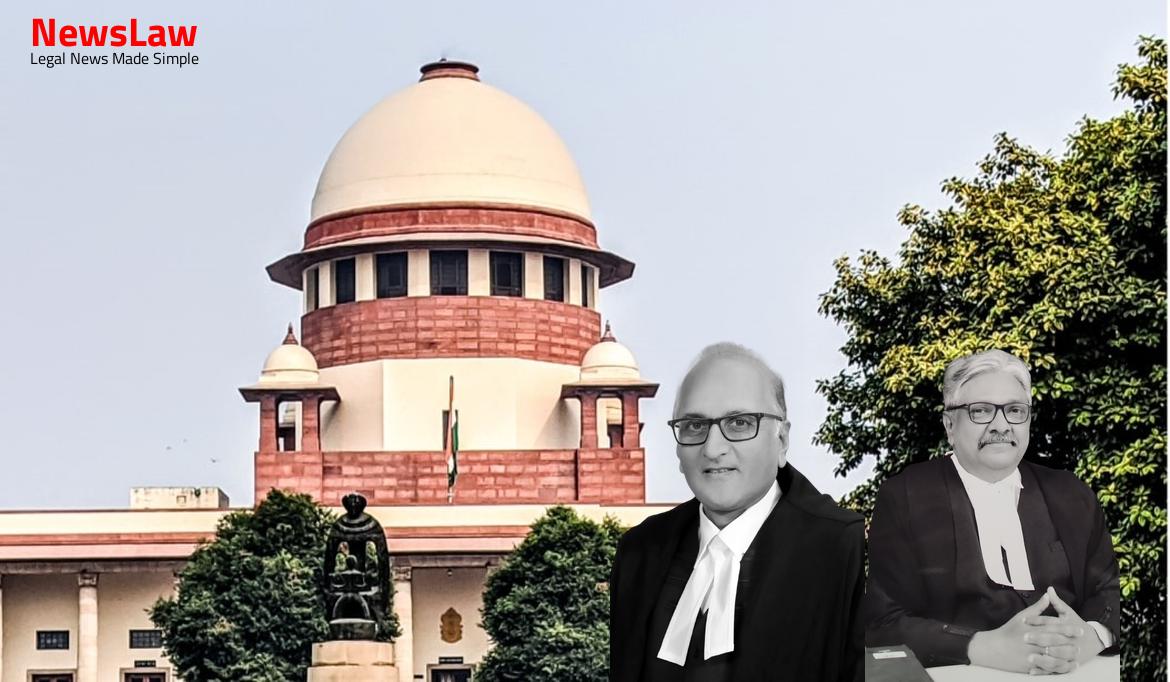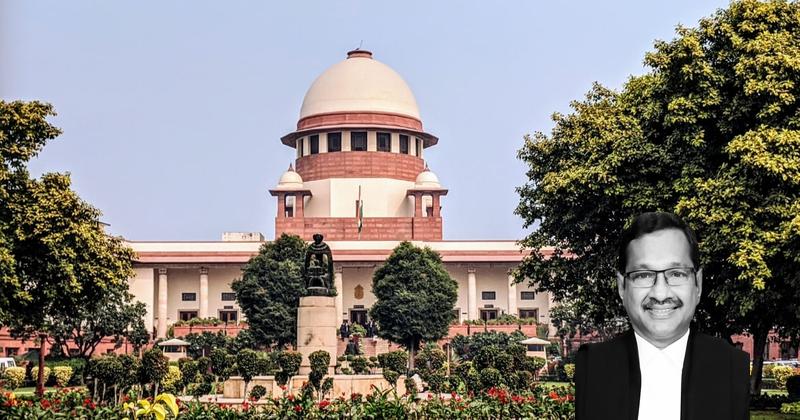Aggrieved by the Judgment passed by the High Court of Kerala, confirming an order passed by the Additional District Judge setting aside his election as Councilor of Ward No.5 of Annamanada Gram Panchayath, in the elections held in November-2015, the elected candidate has come up with the above appeals. (vi) Aggrieved by the said judgment of the District Court, the appellant filed a revision petition before the High Court. The appellant herein was cited as accused No.1 and he was also prosecuted additionally for an offence under Section 38 read with Section 52 of the Kerala Police Act. However, the conviction of the appellant herein for the offence under Section 38 read with Section 52 of the Kerala Police Act and the sentence of a fine of Rs.200/- imposed upon him, was upheld by the First Appellate Court.
(v)
However, while filing his nomination in the elections to the Panchayat held in November-2015, the appellant failed to disclose, in Form No.2A, under Rule 6 of the relevant Rules, his conviction under Section 38 read with Section 52 of the Kerala Police Act, 1961. – (1A) Every candidate submitting nomination under sub- section (1) shall not be deemed to be qualified to be elected to fill that post unless he submits, along with such nomination, the details regarding his educational qualification, criminal cases in which he is involved at the time of submission of nomination, property owned by him and other members of his family, liabilities including arrears due from him to any Public Sector Undertaking or Government or Local Self Government Institutions and whether disqualifies for defection under the Kerala Local Authorities (Prohibition of Defection) Act, 1999 in the form and manner as may be prescribed.” Though the language employed in sub-section (1A) of Section 5 52 mandated only the disclosure of the details regarding “ the criminal cases in which he is involved at the time of submission of nomination ”, the High Court invoked Rule 6 of the Kerala Panchayat Raj (Conduct of Election) Rules, 1995 to hold that the suppression of any information relating to past conviction may also amount to suppression of “ involvement in a criminal case ”. Nomination of candidates.- (1) A candidate shall be nominated by means of a nomination paper in Form No.2 and on an application in that behalf of an elector in the electoral roll of any constituency of concerned Panchayat, the Returning Officer shall provide him Form NO.
The High Court reasoned (i) that insofar as elections to the State Assemblies and Parliament are concerned, Section 33A of the Representation of the People Act, 1951 requires the disclosure of only those convictions where a sentence of imprisonment for one year and more had been imposed; and (ii) but that the rules framed in Kerala relating to the elections to Panchayats are more stringent, as they require the disclosure of any involvement in any criminal case. The High Court opined that the Court was obliged to keep in mind the object of such requirement, in the light of the principles laid down by this 7 Court in Union of India vs. It is also further contended by the learned counsel for the appellant that the requirement of a disclosure in terms of Section 8 52(1A) relates only to the involvement in a criminal case at the time of submission of the nomination and that therefore, the requirement under Rule 6 cannot be read as enlarging the scope of Section 52(1A).
According to the learned senior counsel for respondent No.1, the Court is obliged to keep in mind the fact that Section 33B of the Representation of the People Act, 1951, was brought in by the Parliament to nullify the effect of the decision in Association for 9 Democratic Reforms and Anr (supra). – (1) Subject to the provisions of sub-section (2) if the Court is of opinion – 10 (a) that on the date of his election a returned candidate was not qualified, or was disqualified, to be chosen to fill the seat under this Act; or (b) that any corrupt practice has been committed by a returned candidate or his election agent or by any other person with the consent of a returned candidate or his election agent; or (c) that any nomination has been improperly rejected; or (ca) that the details furnished by the elected candidate under sub-section (1A) of section 52 were fake; or (d) that the result of the election, in so far as it concerns a returned candidate, has been materially affected – (ii) by any corrupt practice committed in the interests of the returned candidate by an agent other than his election agent; or (iii) by the improper reception, refusal or rejection of any vote or the reception of any vote which is void; or (iv) by any non-compliance with the provisions of this Act or of any rules or orders made thereunder, the Court shall declare that the election of the returned candidate to be void.
– (a) that no such corrupt practice was committed at the election by the candidate or his election agent, and every such corrupt practice was committed contrary to the orders, and without the consent, of the candidate or his election agent; (b) that the candidate and his election agent took all reasonable means for preventing the commission of corrupt practices at the election; and (c) that in all other respects the election was free from any corrupt practice on the part of the candidate or any of this agents, then the Court may decide that the election of the returned candidate is not void. They are: (i) that the returned candidate was not qualified or was disqualified on the date of his election; (ii) that any corrupt practice has been committed by the returned candidate or his election agent or by any other person with the consent of the returned candidate or his agent; (iii) that any nomination had been improperly rejected; (iv) that the details furnished by the elected candidate under sub- section (1A) of Section 52 were fake; and (v) that the result of the election, insofar it concerns the returned candidate, has been materially affected either by the improper acceptance of any nomination or by any corrupt practice committed in the interest of the returned candidate by an agent other than his election agent or by the improper reception, refusal or rejection of any vote or the reception of any vote which is void or by any non-compliance with the provisions of this Act or of any Rules or orders made thereunder. For setting aside an election under any one or more of the contingencies mentioned in clauses (a), (b), (c) and (ca), it is not necessary for the Court to find if the result of the election, insofar as it concerns the returned candidate, has been materially affected or not. Sub-section (1) of Section 102 places, (i) improper acceptance of any nomination; (ii) commission of any corrupt practice in the interest of the returned candidate, but by any agent other than his own election agent; (iii) the improper reception, refusal or rejection of any vote or the reception of any vote which is void; and (iv) the non-compliance with the provisions of the Act or any Rules or orders made thereunder, in one group or class, where the Court is obliged to look into an additional factor namely whether the result of the election was materially affected due to any of these factors.
Corrupt practices.- The following shall be deemed to be corrupt practices for the purposes of this Act – (1) “Bribery”, that is to say, – 14 (A) any gift, offer or promise by a candidate or his agent or by any other person with the consent of a candidate or his election agent of any gratification, to any person whomsoever, with the object, directly or indirectly of inducing – (a) a person to stand or not to stand as, or to withdraw or not to withdraw from being a candidate at an election, or (b) an elector to vote or refrain from voting at an election, or as a reward to – (i) a person for having so stood, or not stood, or for having withdrawn or not having withdrawn his candidature; or (ii) an elector for having voted or refrained from voting; (B) the receipt of, or agreement to receive, any gratification, whether as a motive or a reward – (a) by a person for standing or not standing as, or for withdrawing or not withdrawing from being, a candidate; or (b) by any person whomsoever for himself or any other person for voting or refraining from voting, or inducing (2) “Undue influence”, that is to say, any direct or indirect interference or attempt to interfere on the part of the candidate, or his agent, or of any other person with the consent of the candidate or his election agent; with the free exercise of any electoral right: Provided that – (a) without prejudice to the generality of the provisions of this clause any such person as is referred to therein who – (i) threatens any candidate or any elector, or any person in whom a candidate or an elector is interested, with injury of any kind including social ostracism and ex- communication or expulsion from any caste or community; or 15 (ii) induces or attempts to induce a candidate or an elector to believe that he, or any person in whom he is interested, will become or will be rendered an object of divine displeasure or spiritual censure, shall be deemed to interfere with the free exercise of the electoral right of such candidate or elector within the meaning of this clause; (b) a declaration of public policy; or a promise of public action, or the mere exercise of a legal right without intent to interfere with an electoral right shall not be deemed to be interference within the meaning of this clause.
(4) The promotion of, or attempt to promote, feelings of enmity or hatred between different classes of the citizens of India on grounds of religion, race, caste, community, or language, by a candidate or his agent or any other person with the consent of a candidate or his election agent for the furtherance of the prospects of the election of that candidate or for prejudicially affecting the election of any candidate. (6) The hiring or procuring, whether on payment or otherwise, of any vehicle or vessel by a candidate or his agent or by any other person with the consent of a candidate or his election agent, or the use of such vehicle or vessel for the free conveyance of any elector (other than the candidate himself, the members of his family or his agent) to or 16 from any polling station provided under section 45: Provided that the hiring of a vehicle or vessel by an elector or by several electors as their joint cost for the purpose of conveying him or them to and from any such polling station or place fixed for the poll shall not be deemed to be a corrupt practice under this clause if the vehicle or vessel so hired is a vehicle or vessel not propelled by mechanical power: Provided further that the use of any public transport, vehicle or vessel or any tramcar or railway carriage by any elector at his own cost for the purpose of going to or coming from any such polling station or place fixed for the poll shall not be deemed to be a corrupt practice under this clause. (8) The obtaining or procuring or abetting or attempting to obtain or procure by a candidate or his agent or, by any other person with the consent of a candidate or his election agent, any assistance (other than the giving of vote) for the furtherance of the prospects of that candidate’s election, from any person in the service of a Panchayat or of Government, and belonging to any of the following classes, namely: – (a) gazetted officers; (b) members of police forces; (c) excise officers; (d) revenue officers; and (e) such other class of persons in the service of the Government as may be prescribed; Provided that where any person, in the service of the Government and belonging to any of the classes aforesaid, in the discharge or purported discharge of his official duty, makes any arrangements or provides any facilities or does any other act or thing, for, to, or in relation to, any candidate or his election agent or any other person acting with the consent of the candidate or his election agent, (whether by reason of the office held by the candidate or for any other reason), such arrangements, facilities or act or thing shall 17 not be deemed to be assistance for the further Explanation 3.– For the purposes of clause (8), notwithstanding anything contained in any other law, the publication in the Gazette of the appointment, resignation, termination of service, dismissal or removal from service of a person in the service of the Government or of a Panchayat shall be conclusive proof – (i) of such appointment, resignation, termination of service, dismissal or removal from service as the case may be, and (ii) where the date of taking effect of such appointment, resignation, termination of service, dismissal or removal from service as the case may be, is stated in such publication; also of the fact that such person was appointed with effect from the said date, or in the case of resignation, termination of service, dismissal or removal from service, such person ceased to be in such service with effect from the said date.
Since the expression “ corrupt practice ” is defined in Section 120(2) to include ‘ undue influence with the free exercise of any electoral right ’, it is argued by the respondent No.1 that the case may fall under Section 102(1)(b) also, in view of the law laid down in Krishnamoorthy (supra) 22. The election of the returned candidate was challenged in that case under the provisions of Section 259 read with Section 260 of the Tamil Nadu Panchayats Act, 1994. – (1) Subject to the provisions of sub- section (2) if the Court is of opinion – (a) that on the date of his election a returned candidate was not qualified, or was disqualified, to be chosen to fill the seat under this Act; or (b) that any corrupt practice has been committed by a returned candidate or 20 been committed by a returned can- didate or his agent or by any other person with the consent of a re- turned candidate or his agent, or (c) that any nomination paper has been improperly rejected, or (d) that the result of the election in- sofar as it concerns a returned can- didate has been materially affected – (i) by the improper acceptance of any nomination, or (ii) by any corrupt practice commit- his election agent or by any other person with the consent of a returned candidate or his election agent; or (c) that any nomination has been improperly rejected; or (ca) that the details furnished by the elected candidate under sub-section (1A) of section 52 were fake; or (d) that the result of the election, in so far as it concerns a returned candidate, has been materially affected – (i) by the improper acceptance of any nomination, or (ii) by any corrupt practice committed in the interests of the returned candidate by an agent other than his election agent; or (iii) by the improper reception, refusal or rejection of any vote or the reception of any vote which is void; or (iv) by any non-compliance with the provisions of this Act or of any rules or orders made thereunder, the Court shall declare that the election of the returned candidate to be void. The decision in Krishnamoorthy arose at a time, place and circumstance (i) when the disclosure regarding criminal antecedents was made mandatory only under the Notifications of the State Election Commission; and (ii) the non- 21 disclosure was not yet made a ground in the Statute, for declaring the election as void. Apart from the recommendations of the Law Commission, the Association for 22 Democratic Reforms (hereinafter referred to as “ADR” for the sake of brevity) also relied upon the Report of the Vohra Committee of the Government of India, Ministry of Home Affairs, which pointed out the nexus between politicians and those accused of criminal offences. (ii) Though the Delhi High Court held, by its judgment dated 02.11.2000, that it is the function of the Parliament and not that of the Court, to make necessary amendments in the Representation of the People Act, 1951, the Delhi High Court nevertheless issued a direction to the Election Commission to secure to the voters, the following information, from the contesting candidates:- “(a) Whether the candidate is accused of any offence punishable with imprisonment and if so, the details; (b) The assets possessed by a candidate, his or her spouse and dependent relations; (c) Facts giving insight into the candidate’s competence, capacity and suitability for acting as an elected member, including details of the educational qualifications; 23 (d) Information considered necessary by the Election Commission for judging the capacity and capability of the political party fielding the candidate for election.” (iii)
The above directions issued by the Delhi High Court was on the basis that a citizen of the country, whether an elector or not, has a fundamental right to receive information regarding the criminal activities of a candidate.
The contents of paragraph-46 of the decision can be summarised in brief as follows:- “(a) The jurisdiction of the Election Commission is wide enough to include all powers necessary for the smooth conduct of the elections, including the entire process of election consisting of several stages and embracing many steps; (b) The limitation on the plenary character of power is when Parliament or State Legislature has made a valid law. Even if this stipulation is not very much effective for breaking a vicious circle, it will be a step-in-aid for the voters not to elect law breakers as law makers; (d) To maintain the purity of elections and to bring about transparency, the Commission can ask details of the expenditure incurred by political parties; (e) The right to get information in democracy is recognised throughout as a natural right flowing from the concept of democracy; (f) If the field meant for Legislature and Executive is left unoccupied, detrimental to public interest, the Supreme Court would have ample jurisdiction under Article 32 read with 141 and 142 of the Constitution; (g) Voters’ right to know the antecedents including the criminal past of the candidate contesting in the election, is much more fundamental and basic for the survival of democ- racy.”
(2) Prior to six months of filing of nomination, whether the candidate is accused in any pending case, of any offence punishable with imprisonment for two years or more, and in which charge is framed or cognizance is taken by the Court of law.
(ix) However, almost simultaneously with the issue of the above order of the ECI, the President of India promulgated an Ordinance known as “Representation of the People (Amendment) Ordinance 2002”. – (1) A candidate shall, apart from any information which he is required to furnish, under this Act or the rules made thereunder, in his nomination paper delivered under sub-section (1) of Section 33, also furnish the information as to whether – (i) he is accused of any offence punishable with imprisonment for two years or more in a pending case in which a charge has been framed by the Court of competent jurisdiction; (ii) he has been convicted of an offence other than any offence referred to in sub-section (1) or sub-section (2), or covered in sub-section (3), of Section 8 and sentenced to imprisonment for one year or more. (2) The candidate or his proposer, as the case may be, shall, at the time of delivering to the Returning Officer the nomination paper under sub-section (1) of Section 33, also deliver to him an affidavit sworn by the candidate in a 27 prescribed form verifying the information specified in sub-section (1).
(xi) After this court declared Section 33-B to be unconstitutional, the Election Commission of India issued revised orders dated 27.03.2003 requiring e very candidate, at the time of filing his nomination paper for any election to the Council of States, House of the People, Legislative Assembly of a State or the Legislative Council of a State having such a Council, to furnish full and complete 28 information in regard to the matters specified by this Court, in an affidavit, the format whereof was annexed as Annexure-I to the order. Despite the judgment of this Court in PUCL, Section 100 of the Representation of the People Act,1951 was not amended so as the make the non-disclosure or false disclosure, as one of the grounds for declaring an election as void. Coming back to Section 102(1)(ca), it enables a Court to declare the election of a returned candidate to be void, if the details furnished by him under Section 52(1A) are found to be “ fake ”. Ramanatha Aiyar’s Advanced Law Lexicon, (Volume 2, 5 Edition, 2017), the entry relating to the word “ fake ” simply directs the reader to the entry relating to the word “ forgery ”. Therefore, one 30 has to go to the entry relating to the word “ forgery ” to understand the meaning of the word “ fake ”.
463] “A man’s signature of his own name may amount to forgery.” [IPC (45 of 1860), S. 247.)
Case Title: RAVI NAMBOOTHIRI Vs. K.A. BIJU (2022 INSC 1187)
Case Number: C.A. No.-008261-008262 / 2022



